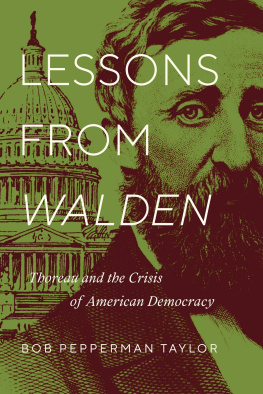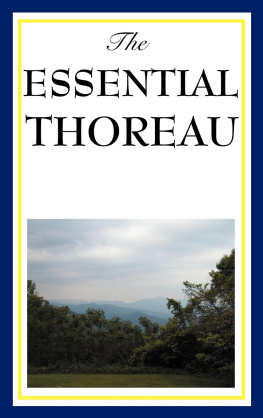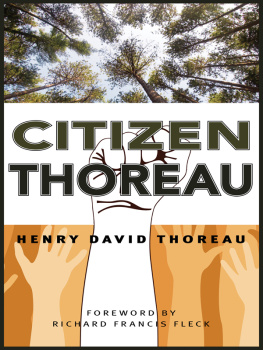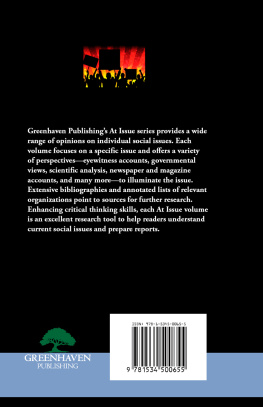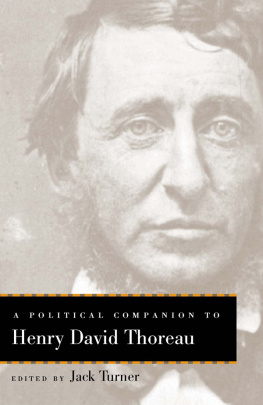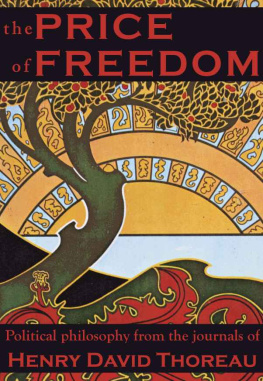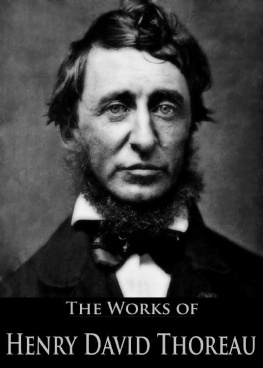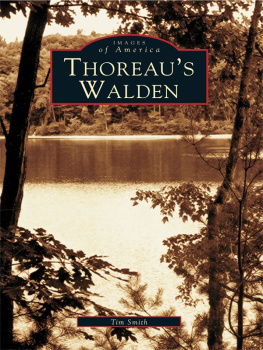Copyright 2020 by the University of Notre Dame
Notre Dame, Indiana 46556
undpress.nd.edu
All Rights Reserved
Published in the United States of America
Library of Congress Control Number: 2019054909
ISBN: 978-0-268-10733-8 (Hardback)
ISBN: 978-0-268-10736-9 (WebPDF)
ISBN: 978-0-268-10735-2 (Epub)
This e-Book was converted from the original source file by a third-party vendor. Readers who notice any formatting, textual, or readability issues are encouraged to contact the publisher at
PREFACE
Henry David Thoreau occupies two critical positions in the American story, one as an advocate of civil disobedience to unjust political authority, and the other as an advocate for nature and its appropriate role in our economic, moral, and spiritual lives. Both of these matters are central to what Thoreau has offered our American literary, political, and environmental traditions. The most expansive expression of his views is found in his masterwork, Walden.
When we begin probing these contributions we find, not surprisingly, that they are more complex and challenging than may first appear. In what follows, I will discuss three central claims found in Walden, each of them familiar even to those only casually familiar with Thoreaus book. (1) He believes we need to simplify our lives and that we may, in fact, need to cultivate what he calls voluntary poverty; (2) he encourages us to follow our moral intuition (to follow our own drummer) for the sake of maintaining our moral integrity; and (3) he recommends that we live close to and learn from the natural world. All three of these pieces of advice have been embraced (or criticized) with more or less enthusiasm (or vitriol) by generations of Walden readers, even as what these recommendations might mean has not always been clear. My purpose in this book is to explain what I think Thoreau had in mind, what I believe his ideas demand of us, and the ways in which these demands resonate in our own time.
ACKNOWLEDGMENTS
Ben Minteer, Patrick Neal, Fran Pepperman Taylor, and Alex Zakaras all read an early draft of this book and provided comments that were (as always) of great value to me. Three anonymous reviewers for the University of Notre Dame Press offered equally interesting, provocative, and helpful reports that guided me as I worked my way through another draft of the manuscript. Stephen Wrinn, director of the press, was the source of both insightful comments and encouraging support for the project. I am, once again, overwhelmed by the thoughtfulness, scholarship, and generosity of my friends and colleagues. My heartfelt thanks to all.
The bulk of the writing for this book was completed during a sabbatical leave for 201718. I am grateful to the College of Arts and Sciences at the University of Vermont for providing me with the leisure to work on this project. I would also like to thank the library staff at Saint Michaels College for greeting me with such good cheer each morning as I sought a quiet writing space in their lovely facility.
INTRODUCTION
The Challenge of Walden
To spend even a little time with Henry David Thoreaus Walden is to recognize that an overriding image of the bookperhaps the overriding imageis that of awakening. Early on, Thoreau boasts that he hopes to crow like a rooster, like chanticleer, in order to wake his neighbors up.
Even those who have not spent any significant time with Walden may have heard that Thoreau believed that most of his neighbors lived lives of quiet desperation. That is, if one man can willfully and positively transform his life on the strength of an imagined alternative, all people have an equal potential to do the same.
The initial concern that Walden addresses, therefore, is explicitly private and personal. Thoreau makes clear that he went to Walden Pond to transact some private business. and it is certainly true that the book builds to an inspirational crescendo in which Thoreau assures us that we can live simpler, more imaginative, more independent, and profoundly more satisfying lives.
There is a subtext here, however, that is less obvious but equally important. Thoreau goes to pains to tie his experiment at Walden not only to the private concerns he believes he shares with many of his neighbors, but also to the public and collective nature of our society and nation. He notes that he moved to his cabin on the Fourth of July (ironically suggesting that this was an accident), tethering his private act to our collective Independence Day. There are other hints that he has real interest in producing a healthier public life. Consider this famous passage from the conclusion to the chapter entitled Reading:
In this country, the village should in some respects take the place of the nobleman of Europe. It should be the patron of the fine arts. It is rich enough.... To act collectively is according to the spirit of our institutions; and I am confident that, as our circumstances are more flourishing, our means are greater than the noblemans. New England can hire all the wise men in the world to come and teach her, and board them round the while, and not be provincial at all. That is the uncommon school we want. Instead of noblemen, let us have noble villages of men. If it is necessary, omit one bridge over the river, go round a little there, and throw one arch at least over the darker gulf of ignorance which surrounds us.
In Thoreaus imagined future, our noble villages of men would have their spiritual and philosophical priorities settled in favor of learning and deliberation, and against the endless and frenetic pursuit of wealth. We know, from a comment about helping move a runaway slave along the Underground Railroad to Canada, to say nothing of what he writes in any number of his abolitionist writings, that Thoreau ties his imagined and potentially more thoughtful, less materialistic neighbors to a significantly more just and egalitarian society. The focus of Walden is on private awakening, but we know Thoreau thinks such awakenings have deep significance for our public affairs. Political reform results from private reform, however, and cant be the primary focus of the reform process. First things first.
There are two essential elements of Thoreaus project that interest us here. The first is that his concern about the character of his neighbors ties him to an ancient tradition of disquiet about the nature of democratic citizens, a worry with profound resonance in our own time. The second is that these worries are integrally tied to a set of claims about our relationship with the natural world, another matter with profound resonance today. The contention of this book is that these interrelated elements of Thoreaus discussion constitute strong reasons to pay attention to Thoreaus project in Walden. The first claim is that Thoreaus book is one of Americas most significant and influential meditations on the moral character of (relatively) free peoples, and, by implication, their relation to (relatively) free societies. The second claim is that Thoreau closely ties this set of observations to a deep interest in and concern about nature. His view is that to be responsible and happy individuals, individuals capable of cultivating freedom for the sake of the most humane and satisfying lives available, we must tame our current passions, impulses, and desires and rechannel them in more humane and satisfying ways; that in order to do this, we must learn from the natural order of the world around us; and that these developments are the preconditions for a genuinely free and equalthat is, democraticsociety. Put another way,

